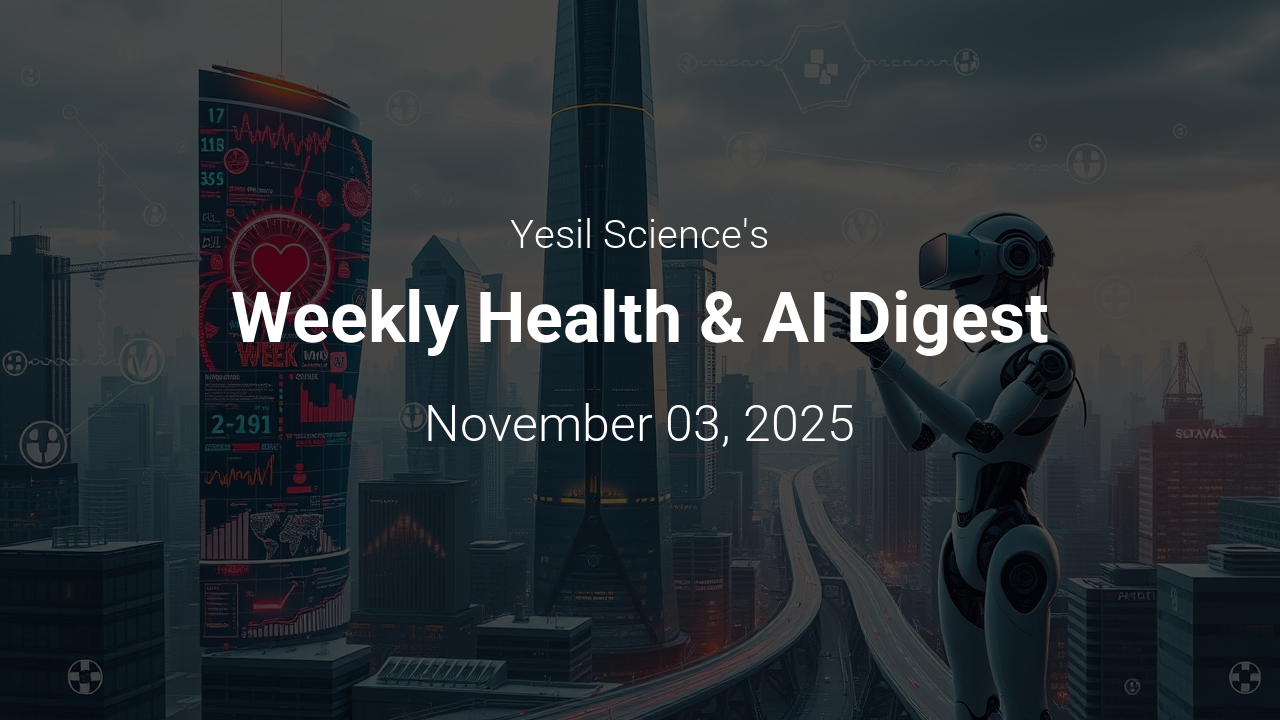Here are the latest breakthroughs in health & AI (November 03, 2025 week)
🔹 AI Enhances Pandemic Preparedness and Surveillance
AI can enhance pandemic preparedness by analyzing diverse data sources for early pathogen detection. 🌍🔍
——-
🔹 Mapping study on AI-based technologies in palliative care – a scoping study.
AI in Palliative Care: Enhancing Quality of Life through Technology 🤖💖
——-
🔹 New Antibiotic for Inflammatory Bowel Disease Developed with AI Insights
New antibiotic enterololin targets inflammatory bowel disease, developed with AI insights. Promising treatment for Crohn’s patients. 🦠💊
——-
🔹 [Psychiatry in the digital age: technological revolution and ethical challenges].
Digital psychiatry evolves with AI, enhancing care access but raising ethical concerns. Balance is crucial for effective treatment. 🤖🧠
——-
🔹 CT Scan Changes Over One Year Predict Outcomes in Fibrotic Lung Disease
CT scan changes over one year can indicate future outcomes in fibrotic lung disease. 📈🫁 Early detection is crucial.
——-
AI in Laser-Assisted Oral Surgery: Precision, Efficiency, and Challenges Ahead 🤖💉
——-
🔹 Precision medicine in orthopaedics: A review of current technologies and future directions.
Precision medicine in orthopaedics integrates individual characteristics for tailored treatments, enhancing outcomes with AI and robotics. 🤖🔍
——-
Chatbots’ responses to suicide risk queries show alignment with expert clinicians at extremes but inconsistencies in intermediate risks. 📊🤖
——-
🔹 Highland Rebrands to Enhance Support for Health Tech Companies
Highland rebrands to better support health tech companies in navigating market opportunities and driving growth. 📈💡
——-
🔹 AI-Powered Virtual Reality Simulation for Clinical Handover Training: A Development Framework.
AI-Driven VR Enhances Nursing Handover Training: 3-Layer Framework, Real-Time Feedback, Pilot Study Results 📊👩⚕️
——-
AI in Chest Diagnostics: Evaluating Implementation, Costs, and Experiences in NHS Networks 📊🤖
——-
AI transforms stroke care: enhancing diagnostics, predicting outcomes, and optimizing workflows. Key findings from a recent PubMed review. 🧠💡
——-
🔹 AI Tools Enhance Understanding of Disease Origins
AI tools are aiding scientists in tracking disease origins and immune responses, enhancing treatment strategies. 🧬🔍
——-
Implementation science bridges AI and medical imaging, addressing barriers for effective clinical adoption. 🤖📊
——-
“Multimodal contrastive learning enhances rs-fMRI analysis for post-surgery brain network recovery in hypothalamic hamartoma patients. 🧠🔍”
——-
🔹 New AI Framework Enhances Immune System Analysis
New AI framework improves immune system analysis, offering faster and more accurate cell identification. 🧬🤖
——-
🔹 Ethical aspects of the application of artificial intelligence in allergology.
AI in allergology: ethical challenges, bias, and the need for robust guidelines. 🤖⚖️
——-
🔹 Addressing Menopause Symptoms: Barriers and Opportunities for Improvement.
Menopause symptoms affect 34% of women aged 45-60. 87% don’t seek care due to time and awareness issues. 🩺💡
——-
AI models predict pain relief in colorectal cancer patients: 73.8% improved, AUC 0.9167. Key insights from PubMed study. 📊💊
——-
🔹 [Applications and perspectives of artificial intelligence in periodontology].
AI in Periodontology: Enhancing Diagnosis & Treatment with 95% Sensitivity 📈🤖
——-
That’s a wrap for this week’s digest! Stay tuned for more health & AI updates. 🚀💡
#HealthAI #TechNews
